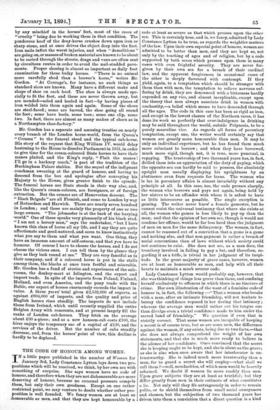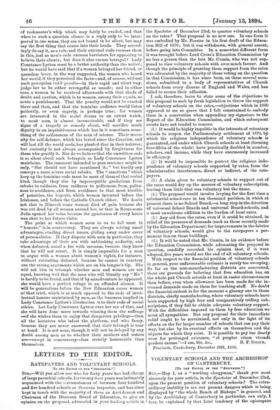THE CODE OF HONOUR AMONG WOMEN.
IN a little paper published in the number of Woman for January 3rd, Lady Constance Lytton lays down two pro- positions which will be received, we think, by her own sex with .something of surprise. She says women have no code of honour, and therefore when they are not dishonourable are more deserving of honour, because no external pressure compels them, but only their own goodness. Except on one rather restricted point, we may venture to doubt whether either pro- position is well founded. We fancy women are at least as .honourable as men, and that they are kept honourable by a
code at least as severe as that which presses upon the other sex. This is certainly true, and is, we fancy, admitted by Lady Constance Lytton to be true, as regards the weightier matters of the law. Upon their own especial point of honour, women are admitted to be better than men, and they are kept so, not only by the teaching of ages and of religion, but by a code supported by both sexes which presses upon them in many cases with even frightful severity. They are never for- given by their own sex for a breach of their cardinal law, and the apparent forgiveness in occasional cases of the other is deeply flavoured with contempt. If they yield, again, to a temptation which should be stronger with them than with men, the temptation to relieve nervous suf- fering by drink, they are denounced with a bitterness hardly expended on any vice, and almost inexplicable, except upon the theory that men always associate drink in women with unchastity,—a belief which seems to have descended through all the ages. The code in this case has been as rigid as iron, and except in the lowest classes of the Northern races, it has done its work so perfectly that over-indulgence in drinking may be said throughout the world, outside Polynesia, to be a purely masculine vice. As regards all forms of pecuniary temptation, except one, the writer would certainly say that women are greatly more honourable than men. It may be only an individual experience, but he has found them much more reluctant to borrow ; and when they have borrowed, much more rigid, though not, it is true, more punctual, in repaying. The trusteeship of two thousand years has, in fact, drilled them into an appreciation of the duty of paying, which the opposite sex can hardly be said to possess, the absolutely upright man usually displaying his uprightness by an abstinence even from requests for loans. The woman who is lax in pecuniary affairs is almost invariably without any principle at all. In this case, too, the code presses sharply, the woman who borrows and pays not again, being held by her sisters to be an offender with whom it is safest to have as little intercourse as possible. The single exception is gaming. The writer never knewi a female gamester, but he cannot resist the universal testimony that where she exists at all, the woman who games is less likely to pay up than the man; and that the opinion of her own sex, though it would not condone her offence, would be far less hard than the judgment of men on men for the same delinquency. The woman, in fact, cannot be reasoned out of a conviction that a game is a game and nothing else, and that non-payment is rather a breach of social conventions than of laws without which society could not continue to exist. She does not see, as a man does, the treachery involved in failing to pay a bet, and therefore, re- garding it as a trifle, is trivial in her judgment of its turpi- tude. In the great majority of grave cases, however, women are at least as honourable as men, and help with all their hearts to maintain a much severer code.
Lady Constance Lytton would probably say, however, that she was thinking of things less grave than these, and confining herself exclusively to offences in which there is no tincture of crime. Her own illustration of the want of a feminine code of honour is, in fact, the following :—" That a woman who breaks with a man, after an intimate friendship, will not hesitate to betray the confidence reposed in her during that intimacy ; whereas the average man would rather cut his tongue out than divulge even a trivial confidence made to him under the sacred bond of friendship." We question if even that is strictly correct. That some women are incapable of keeping a secret is of course true, but so are some men, the difference against the woman, if any exists, being due to two facts,—that she does not always comprehend the weight of her own statements, and that she is much more ready to believe in the silence of her confidante. Once convinced that the secret she is keeping ought to be kept, and she is silent as the grave; as she is also when once aware that her interlocutor is un- trustworthy. She is indeed much more trustworthy than a man, for to guard a secret she will employ—what shall we call them ?—well, mendacities, of which men would be heartily ashamed. We doubt if women lie more readily than men. Upon grave subjects they are at least as truthful ; but they differ greatly from men in their estimate of what constitutes a lie. Not only will they fib outrageously in order to remain polite, or to shield themselves from small social annoyances and shames, but the subjection of two thousand years has driven into them a conviction that a direct question is a kind
of taskmaster's whip which may fairly be evaded, and that when to such a question silence is a reply only to be inter- preted in one sense, they are not bound to be silent, but may say the first thing that comes into their heads. They accord- ingly do say it, as a rule, and their external code excuses them in this, just as men's code excuses barristers for appearing to believe their clients; but does it also excuse betrayal? Lady Constance Lytton must be a better authority than the writer; but he would have said that if a woman betrayed her friend, or quondam lover, in the way suggested, the women who heard her would, if they perceived the facts—and, of course, without such perception cadit yuwstio—in their rapid and silent way, judge her to be either revengeful or unsafe; and in either ease, a woman to be received afterwards with that shade of doubt and caution, which is to women, among their equals, so acute a punishment. That the penalty would not be exacted there and then, and that the feminine audience would listen patiently, or even eagerly, is perhaps true; for women are interested in the social drama to an extent wnich, to most men, is almost inconceivable, and if they see signs of a tragedy or comedy about, will sacrifice much dignity to an inquisitiveness which has in it sometimes some- thing of the callousness of the man of science. Their neces- sity for self-defence, which has lasted since the Creation, and will last till the world cools, has planted that in their natures; but curiosity is not always accompanied by forgiveness for those who gratify it. Nor do we believe that the unwritten code is so silent about such betrayals as Lady Constance Lytton maintains. The comment intended to pass sentence might be only, "She should not have mentioned it;" but hardly any conveys a more severe social rebuke. The "sanctions "which keep up the feminine code must be most of them of that verbal kind, though they rise by imperceptible gradations from rebuke to coldness, from coldness to politeness, from polite- ness to avoidance, and from avoidance to that most terrible of penalties, the boycott, which women invented before the Irishmen, and before the Qatholic Church 'either. We doubt not that in Nineveh some woman died of pain because she was cut dead by all women around her, or that in Rome some Julia opened her veins because the gynmceum of every house was shut to her future visits.
The point at which women seem to us to fail most in "honour," is in controversy. They are always seizing small advantages, evading direct issues, gliding away under cover of personalities. If they dispute with men in particular, they take advantage of their sex with unblushing audacity, and when defeated, assail a foe with sarcasm, because they know that he will not retort. It is simply impossible for a man to argue with a woman about women's rights, for instance, without retreating defeated, because he cannot in courtesy use the strong arguments which are on his tongue's tip. She will ask him in triumph whether men and women are not equal, knowing well that the man who will bluntly say " No " is hardly to be found, and that if by misadventure he appeared, she would have a perfect refuge in an offended silence. It -will be generations before the New Education cures women of that trick, which is as much opposed to the code of intel- lectual honour maintained by men, as the baseness implied in Lady Constance Lytton's illustration is to their code of social ethics. Let Lady Constance Lytton cure her sex of that, and she will have done more towards winning them the suffrage —if she wishes them to enjoy that dangerous privilege—than all the lecturers who infest the platform, and who fancy, because they are never answered, that their triumph is near at hand. It is not near, though it will not be delayed by any doubt among men as to whether their mothers and sisters are—except in controversy—less strictly honourable than themselves.







































 Previous page
Previous page